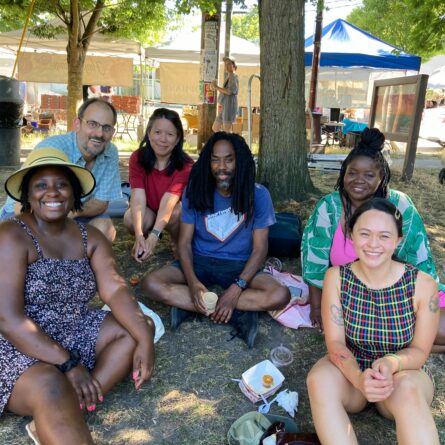
News + Events
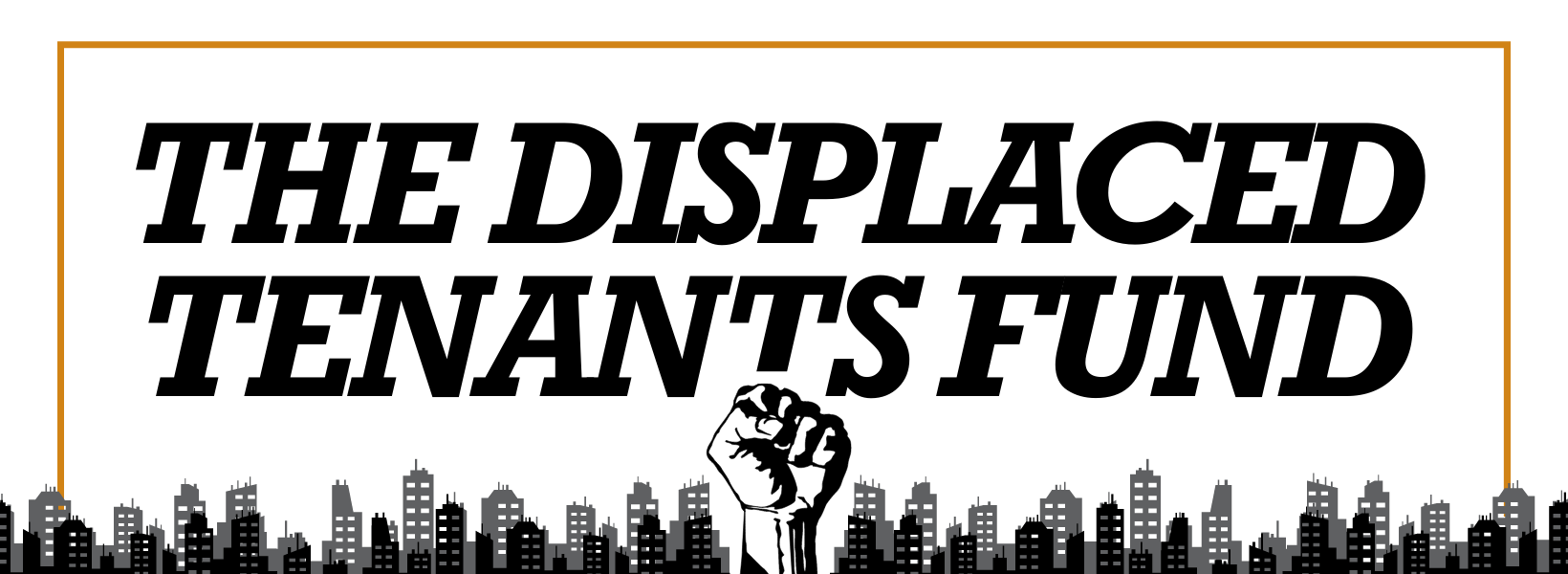
“When a community organizing campaign wins monetary resources, what do they do with it? How can they allocate those resources back to the communities most impacted in an accountable and democratic way?”
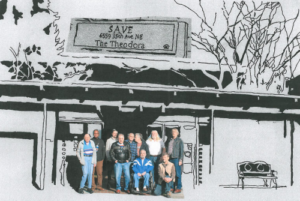
Origins
In 2015, a group of low-income tenants took a behemoth to court and won. A private developer had purchased two low-income apartment complexes to convert into market rate units, destabilizing the lives of the residents and uprooting them from their homes. In a city famous for its scarcity of affordable housing, this was nothing new — across Seattle, affordable housing units have been snatched up left and right to flip into luxury apartments, doomed to sit empty as low and middle-income renters are forced to move further and further away from the place they call home.
These tenants weren’t having it. They got organized with support from the Tenants Union, and although they were ultimately unable to prevent displacement, their campaign continued. They named themselves the Displaced Tenants for Accountability and Transparency (DTAT). When the City of Seattle illegally renewed a permit with Triad Development, a major real estate developer with ties to the company that originally displaced the tenants, DTAT members saw an opportunity for accountability — from the agent of their displacement and the city that gave such big developers preferential treatment while neglecting low-income renters. They fought back and won.
The Displaced Tenants Fund for Housing Justice & Affordability
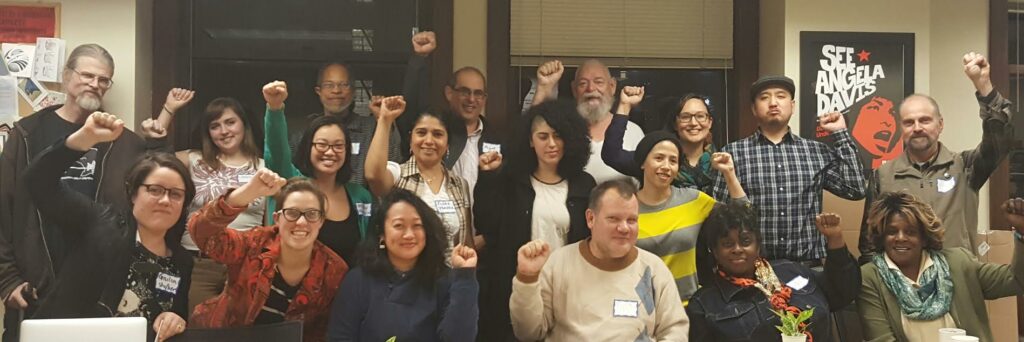
On October 28, 2015, the Displaced Tenants reached a $5.7 million settlement with Triad, announcing that $5.3 million was to be put into a tenant-led fund in support of affordable housing in Seattle that would become known as the Displaced Tenants Fund for Housing Justice & Affordability. $200,000 went to attorney compensation and other fees. Social Justice Fund NW was honored to come on board, stewarding the money and assisting with the grantmaking process.
Since then, the fund has granted over $5,358,000 across three cycles to 22 grassroots housing justice projects in Seattle. The DTAT cohort expanded to include more Black, Indigenous, queer, trans, and disabled renters and organizers with the expertise to ensure the fund effectively challenged mainstream affordable housing grantmaking norms. They reviewed applications from and met with a wide range of prospective awardees, awarding the grants through a democratic process. In the third and final round the cohort weathered the start of the pandemic, transitioning to online organizing as the stakes for housing justice in Seattle rose higher than ever. They committed to long hours and challenging conversations, pushing deeper into just and equitable possibilities for the future of the funding. Some members brought to the forefront the critical importance of supporting organizations typically shut out of mainstream affordable housing funding, particularly organizations led by Black queer and trans folks. The resulting list of awardees is a testament to the power of democratic, community-based grantmaking in advancing movements for justice that are genuinely led by and serving people most impacted by the violence of structural oppression. SJF could not be more proud of the DTAT cohort and grateful to have been a part of their extraordinary achievement.
Shawn Walton, a founding member of DTAT, passed away in September 2021. Shawn’s thoughtfulness, sense of justice, and deep commitment to the work will never be forgotten. Read on for an extended memorial at the end of this article.
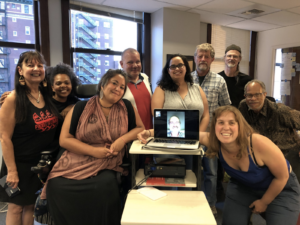
We asked two DTAT cohort members about their experience. Here’s what they had to say:
Evan Sugden | Displaced tenant and participant in all three grant cycles
“I was among the original displaced tenants who met their fate in late 2013. Our organizers from the Washington State Tenants Union and inspired participation of fellow tenants made me a committed housing activist. Participation in our campaign and turning our legal award into tangible benefit for the community has been one of the most enriching experiences of my life. I am most excited about grantees that have bold/creative housing plans and those that can make the largest impact on the complex housing crisis.”
Katherine Poco-Enders | Healer and participant in the second and third grant cycles
“I was part of the second and third DTAT cohort, joining by invitation from Yasmeen Perez. Through DTAT I learned things I didn’t know about myself and my people; I’m half Native American of the Comanche Tribe. I didn’t know about redlining. I didn’t know that places like Chief Seattle Club existed. Connecting with the amazing people on the team was a bonus. I felt very seen and deeply felt, like my opinion mattered. I loved that we could challenge each other; one of the most profound things I’ve ever learned in my life was through this project. I learned that I could disagree, could challenge, and still be in relation with them. I appreciate and grew to love everyone on the team.
While I was inspired by each and every grantee, I was deeply moved by a lot of the Native American sites and the inclusivity of the disabled sites. I am disabled and in a wheelchair — to see those places care so much about inclusion was really profound. Witnessing these grantees’ work felt like seeing a roadmap for the future. These communities have farms, they’re taking care of their elders, disabled people, they’re really living in right relation and asking only for what they need. It’s a non-capitalist way of living, how our ancestors lived before Christopher Columbus came. Places like Chief Seattle Club really, truly embody the belief that we don’t just walk the earth, we are the earth. It’s deeply moving to see people fight so hard to create more endurance, peace, and humanity. It gives me hope.
I’ve learned so much through this experience, including things I didn’t know about myself. I gained more than what I gave. It made me fuller, richer, more of a human being.”
The Grantees
In the years since the tenants were first displaced, Seattle’s housing affordability crisis has seen some promising, if modest, improvements. However, the failure of government at all levels to effectively protect working and disabled people throughout the pandemic has exacerbated the need for stable, accessible, and deeply affordable housing. But grassroots organizers and liberatory thinkers have responded in kind, surging to the forefront with radical blueprints for housing justice they have nurtured in community for years, building on legacies already contributed to by the first two rounds of grantees (click here and here to learn about just a few of the accomplishments past DTAT grantees have achieved).
We couldn’t be more excited to announce the third and final round of awardees of the Displaced Tenants Fund for Housing Justice & Affordability!
Abundance of Hope Center’s (AofH) mission is to provide equitable, culturally responsive, holistic, and person centered homelessness prevention for at-risk youth ages 12-26. Founded in 2008, they are a family-led organization and operated by African American women and other minority groups.
What this grant will fund: The goal of this project is to build capacity towards expanding services and obtaining a building for a transformational home for youth ages 18-26. The plan is for the home to provide a safe space for youth to receive housing, resources, rental history, mental health referrals and financial aid; as well as transferable skills (like financial literacy, home buying seminars for youth, and family reunification) that will empower them through life and its many transitions.
Chief Seattle Club is a Native-led housing and human services agency. They believe that a world without homelessness is possible by leading with Native values. They strive to provide sacred space to nurture, affirm, and strengthen the spirit of urban Native people.
What this grant will fund: The project is located on a 3-acre parcel on the North Seattle College (NSC) campus and includes a Coast Salish Longhouse co-located with affordable housing. The project will be Seattle’s FIRST affordable housing targeting AI/ANs families and includes studios, 1-, 2- and 3-bedroom units. Rents range from $607 for a studio at 30% AMI to $1,504 for a 3-bedroom at 50% AMI. The project provides 200 units of affordable housing targeting homeless youth aging out of foster care and low-income AI/AN families.
Duwamish Valley Affordable Housing Coalition
Duwamish Valley Affordable Housing Coalition (DVAHC) is a collective of Duwamish Valley community members acting to prevent displacement of people and local nonprofits by creating an action plan for affordable housing and cultural and community space for underrepresented and low-income renters and homeowners by seeking partnerships both large and small. They envision a neighborhood that continues to sustain the economic, ethnic, and cultural diversity of those who have historically made their home in the Duwamish Valley. To this end, they seek development that benefits the most vulnerable groups, first and foremost.
What this grant will fund: DVAHC proposes to preserve naturally occurring affordable housing to address displacement of BIPOC and Spanish-speaking populations, and to create systems to support community leadership in the project. DVAHC proposes a community-led, community-inspired project towards equity in accessibility for housing, education services, public space, and opportunity. Funding from the Displaced Tenants Fund will ensure DVAHC’s ability to realize its vision of the preservation of housing for the people who have traditionally called South Park their home, starting with the first people to be displaced, the indigenous people of the Duwamish Valley.
Harriet Tubman Foundation for Safe Passage
The Harriet Tubman Foundation for Safe Passage fights for the emancipation of Black lives by providing a robust framework of support, advocacy, business coaching, community network building and financial literacy to people and organizations working to achieve equity and justice in a system designed to sustain economic and spiritual oppression.
What this grant will fund: This project is a community-led, affordability-focused, and BIPOC-centered partnership with BIPOC Sustainable Tiny Art House Community. Project supports BIPOC artists and cultural workers thriving in place while living in high opportunity/high-risk for displacement zones. HTFFSP is building capacity to house about 20 BIPOC cultural workers while building the capacity for our BIPOC community to create new visions for permanently affordable housing using innovative models yet to be imagined.
InterIm Community Development Association
IterIm Community Development Association (ICDA) is a nonprofit affordable housing and community development organization based in Seattle’s Chinatown/International District (CID). Since 1969 ICDA has provided multilingual, culturally competent housing and community building services to those disenfranchised due to lack of English, low acculturation and poverty. Though historically ICDA’s focus was on the API community living in the CID, they currently serve low-income limited APIs, refugee, and immigrant communities throughout Puget Sound.
What this grant will fund: ICDA will facilitate a culturally appropriate participatory action research project led by low income tenants and other groups at risk of displacement in the International District (ID). This project will guide the design and development of InterIm’s 2 upcoming housing projects, one in the heart of Chinatown and one in Little Saigon. This project will also serve as a springboard to community organizing to fight displacement as those involved build relationships, knowledge, and collective power. Results will be gathered into an ID Anti-Displacement Action Plan to amplify the voices of those impacted by displacement to call attention to their housing needs and wants and barriers to finding a safe and stable home in the ID, and to be used as an organizing and advocacy tool.
Lavender Rights Project elevates the power, autonomy, and leadership of the Black intersex and gender diverse community through intersectional legal and social services. They utilize the law as an organizing principle to affirm their civil rights and self-determination. Their organization disrupts oppressive systems that target Black gender diverse and intersex communities of color and lead to disproportionate levels of poverty, housing disparities, and gender-based violence, especially among Black and Indigenous people.
What this grant will fund: “The House” is an amalgamation of the Lavender Rights Project’s Washington Black Trans Task Force supported by the City of Seattle, King County, and Washington state. Together, they are co-creating a housing facility intended to serve 20 Black gender diverse individuals with single occupancy rooms, private restrooms, and wraparound services designed by and for the needs of the residents. This project will also provide access to physical and mental wellness, community-based programming, employment services, fresh and whole food, safety, and stability.
Na’ah Illahee Fund is an Indigenous women-led organization dedicated to the ongoing regeneration of Indigenous communities. Through grantmaking, capacity-building and community-based intergenerational programming, they seek transformative change by supporting culturally grounded leadership and organizing. Focused on Indigenous Ecology, Food Sovereignty, and Wise Action, they work to advance climate and gender justice, while creating healthy pathways towards self-determination and movement-building.
What this grant will fund: This funding will support the pre-development phase of the Native Neighborhood, a community-led project to create a multi-acre, multi-use space that will include space for Native nonprofits, Tribal nations, and businesses; arts and cultural gatherings; affordable housing; and outdoor green space for ceremonies and sharing traditional food, medicine, and ecological knowledge.
Queer The Land was formed to directly address the root causes and power structures that displace QT2BIPOC communities and destabilize the organizing work that is vital to their survival. The idea for this project comes from their collective experience: the lived experience of the housing crisis and economic displacement in Seattle. They want to build the solution themselves as the communities most impacted by these issues. They envision Queer The Land as a rare community space where the needs of QT2BIPOC are centered and their dreams are nurtured.
What this grant will fund: Queer the Land now owns a house on Beacon Hill and is seeking funding to turn it into the fantastical community house of their dreams. The twelve bedroom house will provide bedrooms for tenants, workspace, recording studio, large kitchen with pantry, laundry space, garden including medicinal herbs and culturally significant foods. Rent charges will be determined and negotiated with the individual applicant and the community according to their ability and the house’s needs.
Trans Women of Color Solidarity Network
The Trans Women of Color Solidarity Network (TWOCSN) is led by Trans people of color and advances the lives of Trans Women, Femmes, Two-Spirit and people of color living in Washington State by ensuring their basic needs are met. They uphold the self determination of Two-Spirit, Trans Women and Femmes of color and create opportunities to exercise collective and community care.
What this grant will fund: This project supports TWOCSN in acquiring an apartment building in Capitol Hill (or somewhere transit accessible in south Seattle) that would have at least 10 rent-free units that prioritize living space for formerly incarcerated/houseless/economically insecure BITWOC. They will use the grant as capacity building funds to hire staff to continue fundraising, connecting with community on this project, and taking the steps necessary to acquire a property.
In Memoriam: Remembering Shawn Walton, housing justice activist and founding member of the Displaced Tenants for Accountability & Transparency
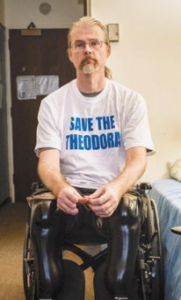
At the end of this more than seven year long process, we want to honor Shawn Walton, a founding member of Save the Theodora, Displaced Tenants for Accountability & Transparency, and someone who participated in all the rounds of grantmaking, rarely if ever missing a meeting or gathering.
When I first met Shawn, he lived at the Theodora, an affordable housing complex built with government subsidies. The Theodora was his home. He moved to the Theodora in 2011 after being hospitalized and having his legs amputated. He said that being back in his old neighborhood was a huge boost to his morale. He worked hard through rehab and then through the assisted living program at the Theodora to be able to live independently, and was able to move from a wheelchair to using prosthetics. When Shawn learned that a for-profit developer was going to buy the building and displace the residents, he was eager to organize to keep his home and to keep the Theodora for so many others. I remember knocking on his door and — unlike others who were not interested or didn’t have the time — he welcomed me in immediately and was ready to show up and do what needed to be done. He joined the resident committee as the resident notetaker and was a key part of organizing efforts.

“I’m Shawn and I’ve lived here at the Theodora since 2011. I’d been hospitalized in 2010, my apartment in Wedgwood had been cleared out and everything I owned placed in storage. By the time I was discharged, both my legs had been amputated below the knee, four fingers were gone as well, and my primary means of getting around was in a wheelchair. I spent several pretty miserable months in an assisted living facility down in SeaTac before finally getting into the assisted living program that existed at that time here at the Theodora. Being back in my old neighborhood, I’d first moved here in 1995, was a vast improvement in my circumstances and morale, and I was able to transition to getting around on my prostheses, walking over to the library or taking the bus again. When the assisted living program here was discontinued, my condition had improved so much that I was offered the opportunity to stay on as an independent resident. Being on disability, I can’t afford to spend much, the Theodora allows me the perfect combination of accessibility, affordability, assistance and independence to start reclaiming my life after what I’ve been through. I wish I could count on the Theodora still being here as a secure home base.”
For months Shawn and his neighbors fought for the building. They organized press conferences, protests, and spoke out in city planning meetings. They met with Councilmembers and the Mayor’s office. Through their organizing they got increased relocation assistance money and dedicated attention to move out process but the developer, Goodman Real Estate, ended up going through with the plans and the tenants were displaced.
Even after Shawn moved far away from his home, all the way up to Shoreline, he continued to fight for justice. He participated in another lawsuit against the developers who had convinced the city to illegally renew permits they needed to develop a square block piece of property downtown. Shawn was part of multiple rounds of negotiations and finally after a mediation that went well past midnight secured a settlement from the developer for $5.7 million dollars.

Shawn and his co-tenants helped craft a democratic process to distribute the funds to affordable housing projects. They went through three rounds of grantmaking, first to distribute approximately $500,000, then nearly $2.5 million, and then another nearly $2.5 million. They brought in other people into the grantmaking committee from groups who were not represented in the initial group of tenants: Black, Indigenous and People of Color, Women, Queer, Trans and Gender Non-Conforming people.
Shawn participated in the process until he passed away this September, even though we weren’t always able to do everything we should have to make him as comfortable as possible and every session was extra challenging for him. Shawn was humble and modest and I very much doubt we know all that good that he is responsible for in this world, but Shawn was also so much more than all of this. He was kind, funny, and values driven. He was thoughtful — he didn’t talk a lot but when he did he always cut to the heart of matters. He cared a lot about issues like gun control and feminism. He told me about times he got into arguments with people in the gaming scene on the internet and how frustrated he was by the hate they spewed. In our own group, he disagreed sometimes with people’s political views, but he figured out how to work with them anyway for the greater cause. He loved science fiction, toy models, and was always up on the news. He was a good friend, neighbor and person and he is and will be missed.
By Eliana Horn, DTAT member
It is a somber and emotionally deep task to try to put into words the respect I had for Shawn. Even though I did not live in close proximity and therefore never knew him as a neighbor, those of us in the DTAT campaign nevertheless grew to know each other as a different sort of community of which Shawn was a central part. Each of us came to this campaign with our own strengths, weaknesses, and stories and we came to value each other for our uniqueness, individually, and as a cohesive group. We were tested in many ways as we struggled to reach our goal. Quite a few left the effort for various reasons, not the least of which was hardship caused by the original evictions we suffered together. Shawn doggedly marched with us despite his immense physical handicaps and hung in until literally his last breath.
Through that experience, Shawn’s character shone incandescently. He was a clear thinker, quiet but deliberate in response, patient, determined and with a fierce reverence for justice. I suppose all of us needed some of those qualities in order to carry ourselves as far as we did. But somehow, Shawn’s virtues seemed like a beacon that helped keep us all stay focused, on track, and together. it is with that deep feeling that I bid farewell to, and will always miss Shawn. Let us be inspired and energized by his spirit to keep making the world a better place
By Evan Sugden, DTAT member
